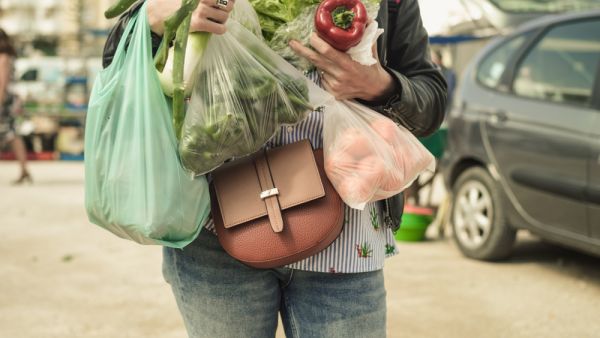When Jbeil Mayor Wissam Zaarour said last summer he would free his city of plastic bags by the new year, reactions ranged from skeptical to baffled.
With Lebanon up to its neck in waste, the move to ban plastic bags across a municipality seemed like a pipe dream, with many questioning whether Jbeil had what it took to enforce such a drastic measure.
According to the municipality’s own statistics, about 60 percent of the businesses under its purview have already committed to stop using plastic bags.
Two of the area’s largest local supermarkets, including Supermarket Jbeil and Hage Supermarket, have both complied, offering their shoppers biodegradable bags.
“We’re phasing out the last of our plastic bags, and should be fully transitioned this month,” Hanine Lawandos, Human Resources manager at Jbeil Supermarket, told The Daily Star.
However, many smaller businesses seem to have fallen by the wayside.
An elderly woman running a convenience store nearby Jbeil’s old city said she had not yet made the move, and would likely not do so if the new rule is not enforced.
“Everyone uses plastic,” she said, skeptical that the ban would truly curb Lebanon’s garbage crisis.
Though Jbeil isn’t entirely plastic-free, Zaarour said his initiative is on track.
“First, we launched the campaign for people to ‘remove plastic from their mind’ on social media,” he said, referring to Jbeil’s new anti-plastic hashtag.
The municipality also worked on a public awareness campaign.
“Before the holidays, the majority of households received this bag with a brochure inside explaining the negative impacts of plastic on the environment,” Zaarour said, proudly holding up a reusable cotton bag bearing the municipality’s logo.
“The municipality’s website also offers businesses alternative options and where to get them.
“Most businesses have decided to offer [nonpaper] biodegradable bags rather than paper [at the checkout,” he added.
The mayor, aware that not all of Jbeil’s businesses have observed the memo, said he was assembling a list of all businesses that have yet to eliminate plastic bags.
Once complete, he said he would be delivering notices to each one, giving them 15 days to find an alternative before they are fined.
National supermarket chains, such as Spinneys and Charcutier Aoun close to Jbeil, are not technically within the municipality’s borders, Zaarour said, leaving them out of his reach.
“Personally, if I’m able to cut down 50 percent of plastic bag usage, I will consider this a success, but of course we are trying to reach 100 percent.”
So far, Zaarour said the municipality has worked to implement the plan on its own, without help from outside groups.
Looking forward, the mayor said he intends to work with dining establishments to cut the use of single-use plastic straws, utensils and take out containers.
He noted that the focus on bags was not enough, but plans to clamp down on other plastic disposable items would have to come after the former is successfully banned.
“Let’s focus on the bags for now,” he said.
Jbeil’s decision is just one example of how some municipalities have sought to take responsibility for local waste issues.
In November, south Lebanon’s Deir Zahrani also made news for its attempt to transition to a “zero-waste” model through education and the elimination of disposable plastic items.
Historically, local governments have long been obliged to take care of their own waste in the absence of a national strategy.
Yet, lack of support from the government leads many to opt for burning their waste in the open, a practice now made illegal.
Parliament passed Lebanon’s first waste management law at the end of September, a move intended as a step forward, but which was in fact largely fruitless.
The legislation officially decentralized waste management, formally placing decision-making in the hands of the local government.
However, a proper implementation guide is absent, leaving many municipalities just as unprepared as before to deal with the country’s chronic issue.
Also missing is a plan to incentivize the country’s recycling industry. Accordingly, most of Lebanon’s recyclables - glass, metals and plastics - land in the dump, where they remain largely intact for decades.
The law has received much criticism from environmentalists and MPs alike for what they say is an inadequate approach to the problem.
While Zaarour is no waste management expert, he said that he believes the new ban on plastic will positively impact his municipality - and hopes that a domino effect will take place.
“I’m just a mayor, so I can’t make changes across the country, but at least I can do something here.”
This article has been adapted from its original source.








